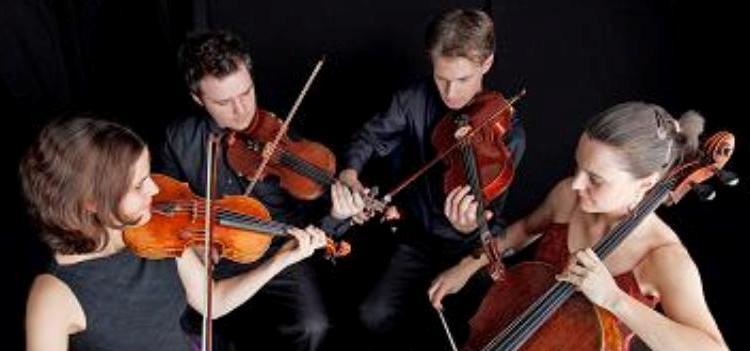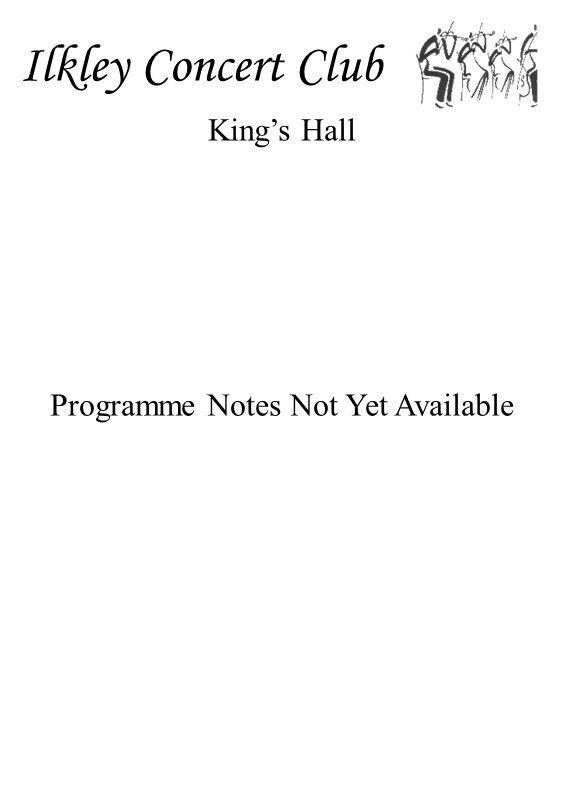REVIEWS
ELIAS STRING QUARTET

Wednesday 20th February 2013
Beethoven – String Quartet in D op. 18 no. 3
Beethoven – String Quartet in F minor op. 95
Beethoven – String Quartet B flat op. 130 with original Grosse Fuge finale op. 133
Quartets from Beethoven's early, middle and late periods will help us to appreciate the extraordinary innovations he brought to musical style.
Haydn and Mozart are not far away in the op.18 quartet (1798). In his shortest quartet op. 95 (1810) Beethoven develops ideas with extraordinary terseness. In the last two years of his life he devoted his energy and genius to a new vision of the string quartet. Op. 130 (1825) with its original finale is one of the results, with its moments of great abandon, ecstasy, grief, pain, joy and tenderness. We are fortunate to hear the acclaimed Elias Quartet. Share their insights via a fascinating interactive website (www. thebeethovenproject.com).
REVIEW BY GEOFFREY KINDER
Spellbinding Playing at the King’s Hall Ilkley
The young players of the Elias Quartet are currently engaged in playing a complete cycle of the Beethoven string quartets in a number of major cities. We were given a mighty sample in their Ilkley concert; at first sight a rather demanding programme of early, middle and late period quartets. But such was the commitment of the playing that what we experienced was exhilarating, sometimes moving and always hugely satisfying.
Read MoreThis is not a ‘period’ group and the players took full advantage of the opportunity to project the music with powerful tone and generous use of vibrato and occasional expressive use portamento (slides between notes). The unanimity of their approach was remarkable. Beethoven’s scores are liberally marked with accents and other dynamics and none of these were missed. If occasionally I wondered if this was overdone, checking the score showed me that this was always precisely what the composer had asked for.
Their opening op.18 no.3 quartet immediately captured our attention, the playing was graceful yet so alive, the perpetuum mobile finale deftly played with a sense of fun at the end. Humour is in short supply for most of the op. 95 ‘serioso’ quartet which was given a powerful reading with ferocious attack at the start. The rare truly relaxed moments were expressively played and the sudden brightening of mood at the end totally convincing.
After the interval came the op.130 Quartet, in many ways Beethoven’s most experimental quartet. The opening was eloquently played, the music’s shifting moods so well caught. The ensuing divertimento-like movements were all strongly characterized. Throughout the concert their dynamic range had been huge and in the Cavatina the hushed pianissimo was heart-stopping.
Owing to their agent’s error the advertised Great Fugue was not played, instead we were given the alternative less challenging finale to round off a wonderful evening. The players invited us to go online to www.The Beethoven Project to view a live performance of the original finale. I did so – it’s terrific.
G.K.
Recommended Recordings
by RAYMOND WAUD
Beethoven String Quartets
My first choice is a 10 CD set of the complete Quartets, Quintets and Fragments from the Endellion String Quartet on Warner Classics 2564 69471-3 (10 CDs for the cost of 3 medium price discs). These are superbly involved performances with excellent recording quality.
A good budget alternative is provided by the Alban Berg Quartet on EMI 7 04413 2 (7 discs for the price of 1 full price CD). The playing is more straightforward than the Endellions and the sound quality is very good.
Recommendations for the individual works are as follows:
Op. 18, No.3
The Takács Quartet on Decca 470 848 2 (2 mid price CDs including all the Op.18 Quartets) provide very thoughtful performances in impressive sound.
Op. 95
Beautiful performances of Op. 74 and Op.95 in excellent sound are given by the Tokyo String Quartet on Harmonia Mundi HMU 807460 (1 SACD disc playable on all players at full price).
Op. 130 & 133
The Lindsays on ASV CDDCA 1117 (medium price) give a typically impassioned performance in excellent sound. The Grosse Fuge is especially powerful and gritty.
Raymond Waud.

